Tim Merlier wins his first Giro stage and weeks later he’d take a Tour stage as well. As well as satisfaction, media coverage and big lines on his palmarès, these wins brought him the sum of 220 UCI points… but in winning the Koksijde Classic and Elfstedenronde he got 325 points.
With 2022 shaping up to be a season where points matter for some, here are all the points tables for the season ahead on one handy page.
First, the table below is for the World Tour races, if it’s a stage race then it’s for the final GC.
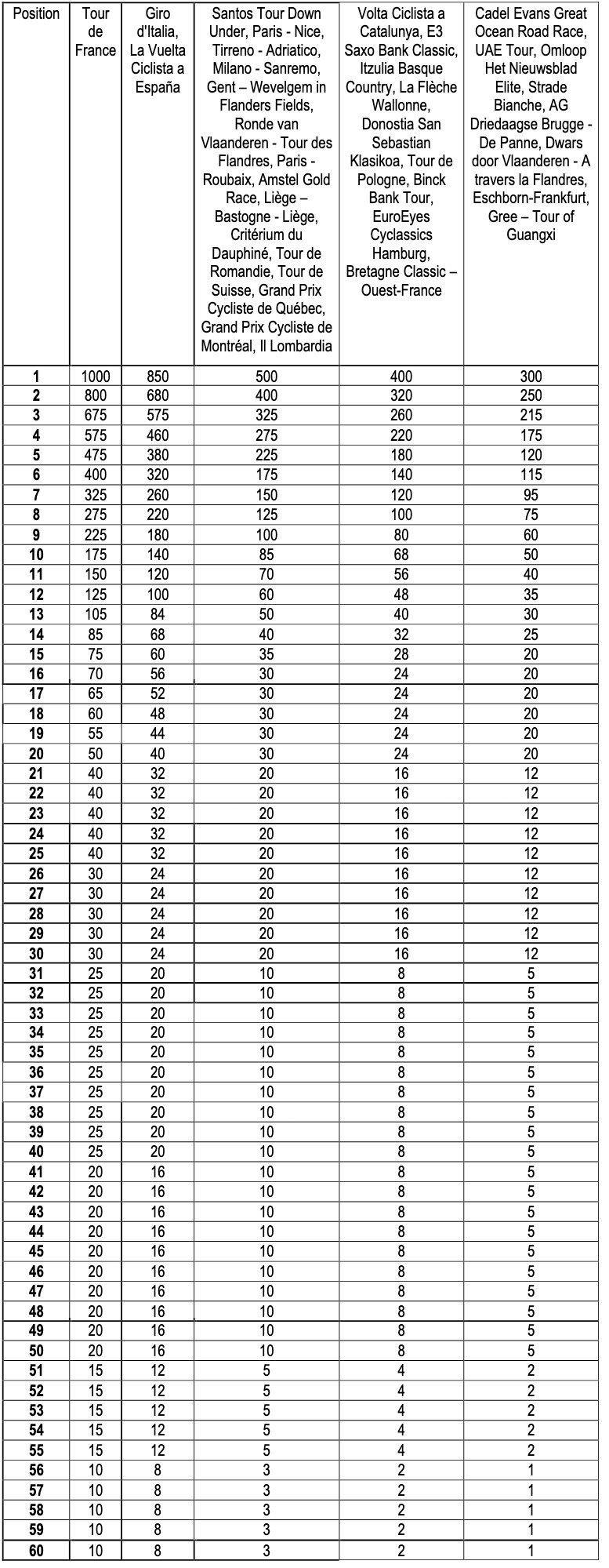
Next comes the points per stage the World Tour and as you can see, there are not less on offer each day, it’s all about the overall, which explains the point about Tim Merlier at the top.
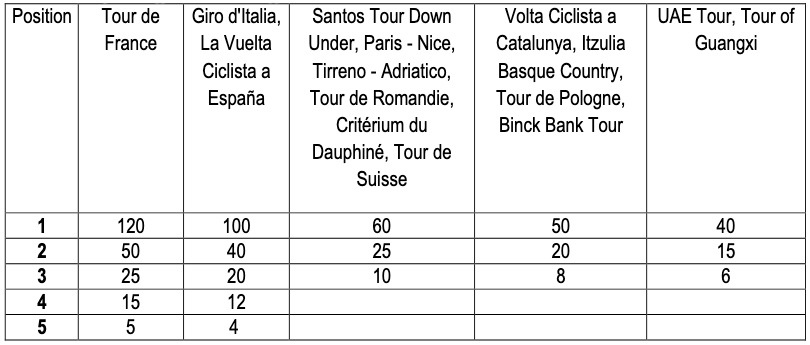
Now you can see points on offer for final place in the secondary competitions of the grand tour, the mountains and points competition:
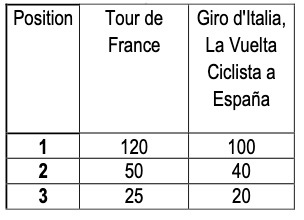
Next comes a daily award for leading a World Tour stage race, a nice bonus but surely worth more in media attention than points.

Now comes arguably the most important table here because it lists the points on offer in a range of races outside the World Tour. Riders and teams who struggle to win big can find opportunities and points galore in the table below. Winning a stage race overall or winning a one day brings the same points haul, which makes one day races very important. The season-opening Challenge Majorca races are a good case study, they are each Class 1 races and so win one and a rider banks 125 points, but if it was a stage race only the final overall would bring this many points.
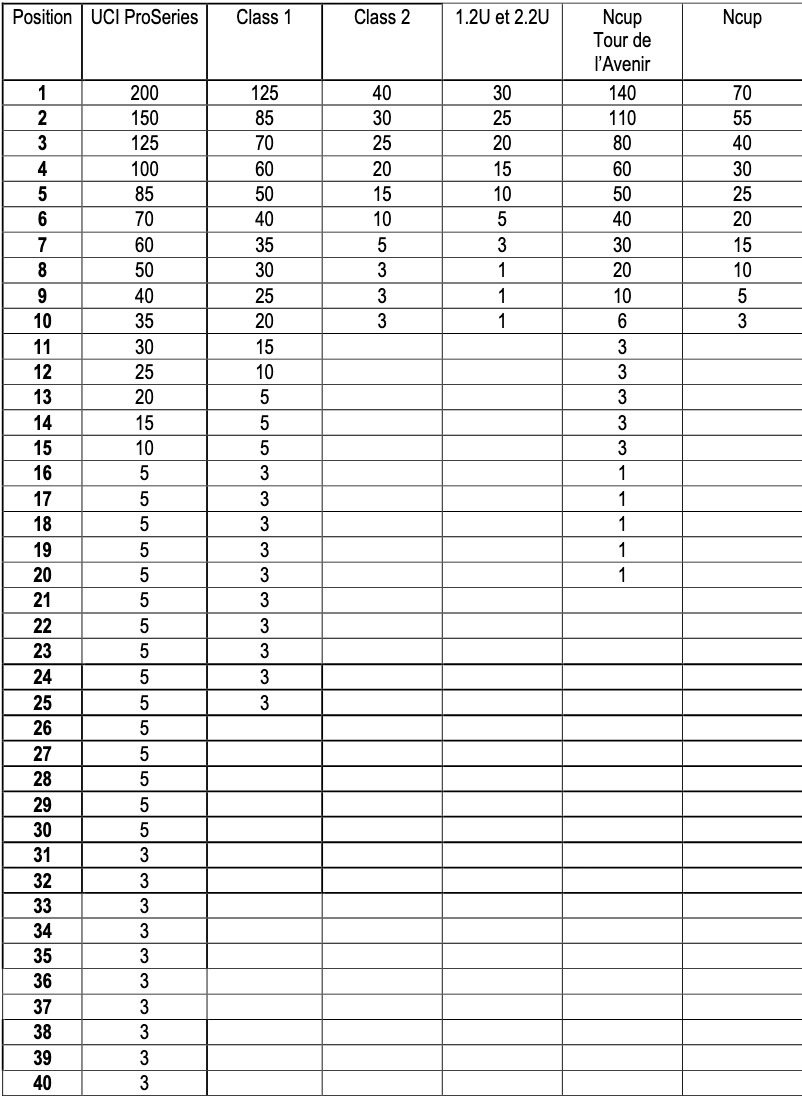
Next two tables below shows the points on offer for stages in non-World Tour races and the daily points for leading the race too.


Next comes the national championships, split into A and B groups, where A is defined as a nation that started at least one rider in the previous Men’s Elite world championship road race. These points matter because often when we look at the teams with few wins and placings in the year, several of their best results can be from national championships in smaller nations, the kind with only a few pros. Sometimes we’ve seen big name riders skip their national championships but smaller teams hunting points ought be paying business class return for their lesser riders to go and grab the jersey and points.
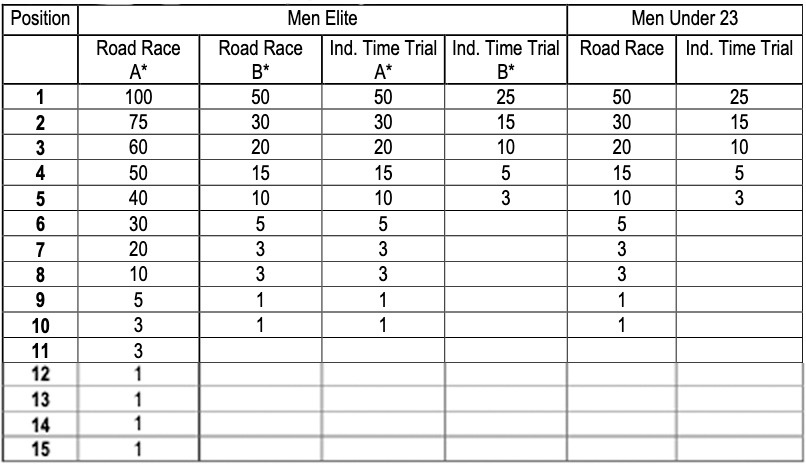
Now comes the Continental Championships, think the European championships for the best example. Other regions are supposed to have them but they can be thin on the ground. 2022 has Asia, Oceania and Europe in the calendar for now. If these championships have a team time trial and/or a mixed relay time trial event, the small table below also applies.
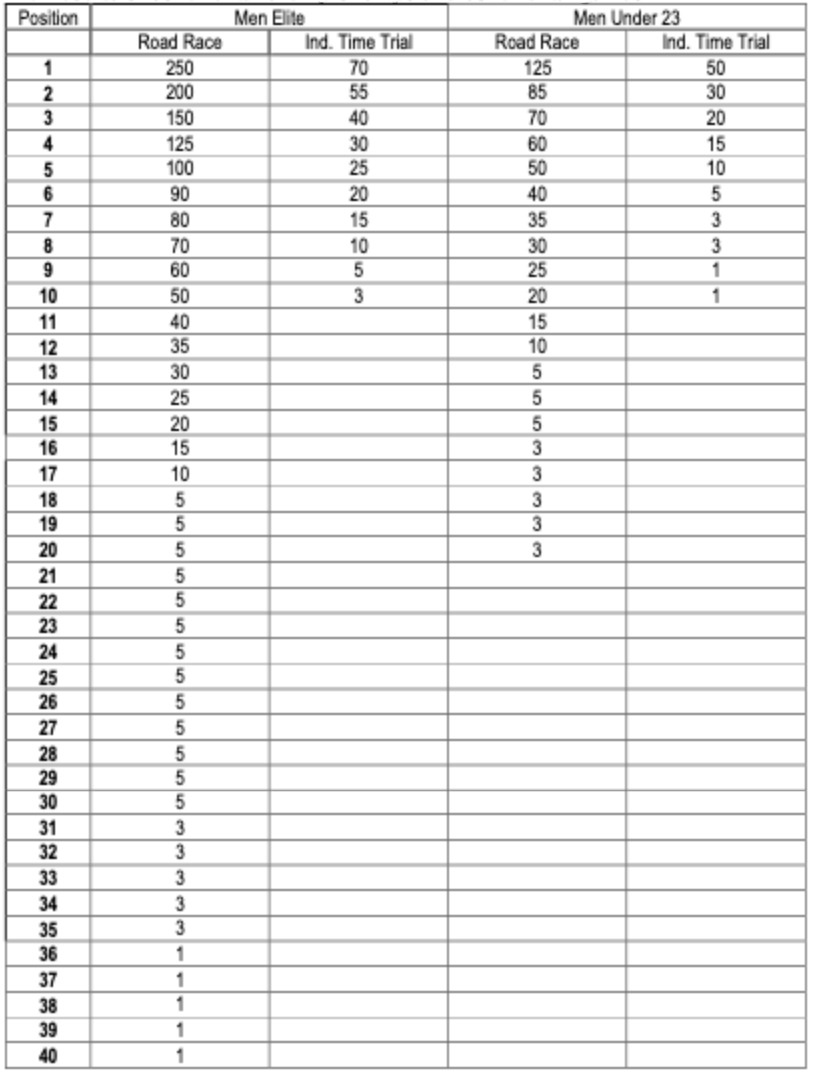
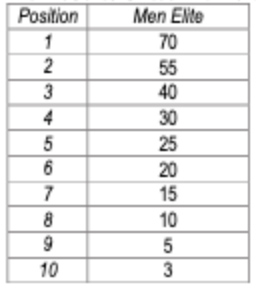
Now for the Worlds and Olympics, obviously big events but the UCI is keen to big them up even more with the points on offer. 200 points for the U23 race can help explain why some teams are happy to see their riders drop down to the U23 ranks for a day as they can hoover up points.

For the last of the tables, here’s the mixed relay race at the worlds which the UCI is keen on promoting and it’s worth a lot… in points terms anyway.
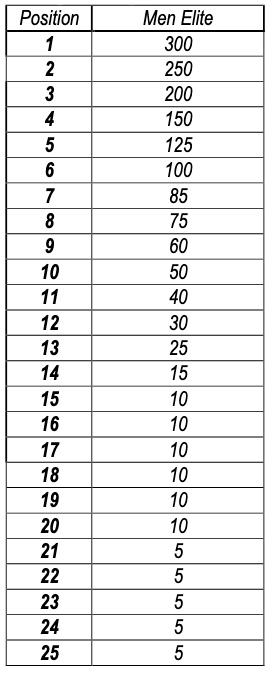
How to forfeit points
As well as winning points by results, riders can lose them. The UCI rules include various penalties for bad behaviour, including points deductions. They concern cheating like taking short-cut, to using sidewalks, ignoring level-crossing red lights, littering and other misdemeanours, right down to failing to sign on for the day’s racing or show up for the post-race press conference if invited. Any team manager worried about scoring points should remind riders of all of these.
Rankings and points don’t matter!
That’s what every team manager says outwardly… but oddly have the points for a seventh in a 2.Pro stage race at the fingertips, or can recall the precise tally each of their leading riders scored last year.
But if rankings did matter then they’d be easy to understand and readily available. One reason for this blog post is so I can have all this season’s points tables on one ready page rather than having to the UCI website, scroll for the regulations page, look up the rulebooks, download Chapter 2 on road races, open the PDF and scroll past 76 pages of text to get the tables. As ever the allocation of these points often tells us more about the committee awarding them than the races themselves.
Team rankings explainer
You take the ten best scorers of UCI points this season on the team, add up the total and this gives you the team’s score, then they are ranked in order. This allows a team to rely on a few riders for points while letting others work as domestiques to help deliver the results and points needed.
Operation Salvage
If teams wants to stay in or join the World Tour, where can they find the easy points. Obviously winning the Tour de France helps but realistically that’s probably something reserved for the handful of teams who are big enough not to worry about the drop zone.
A win in a one day race is often as valuable as the GC in a short stage race, and given most one day races often end in a sprint then having a strong house sprinter helps a lot. Aim for smaller races where the big name sprinters can’t be bothered and where many World Tour teams won’t even start and there’s points galore. This part explains why Alpecin-Fenix sit so high in the rankings, a win in the Elfenstedronde, Paris-Chauny or the GP Monséré brings 125 points… more than the 120 points for a Tour de France stage.
Things to look for in 2022
- To undermining the whole post above, please enjoy the season’s sport and drama rather than worrying too much about points, it’s only a background story among many
- Still there’s the relegation and promotion drama this year, as explained in the 2022 Points Race
- There’s also the contest among the second-tier UCI ProTeams to finish as high as they can because if the World Tour has 18 or 17 teams next season then the best ranked Pro Teams get automatic invites, if there are only 16 in the World Tour in 2016 then the best three teams get picked by default

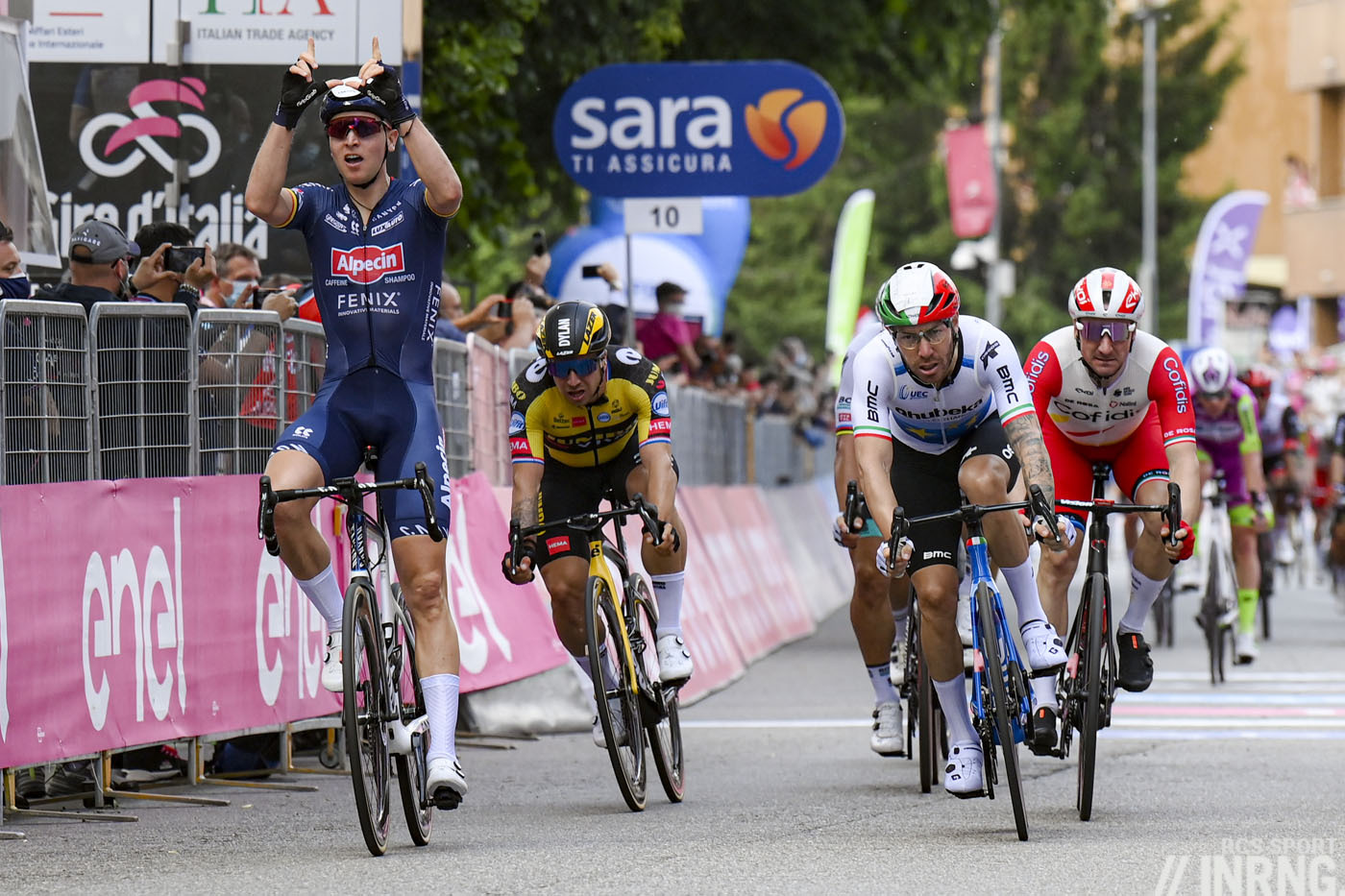
As Inrng points (sorry) out: “the allocation of these points often tells us more about the committee awarding them than the races themselves” – but what does this tell us about the committee/UCI? Is this an insidious attempt to devalue the Tour relative to other races, a way to prod more WT teams to go to the ‘minor’ races, a misunderstanding of the value of a GT stage win, or was the committee just bored and rattled this off with no real thought?
I suppose the rankings are there to establish a coherent identity for the World Tour races, to give them all some kind of shared status. But also for me it still shows the rankings don’t matter that much, teams don’t really care about being 1st, 5th, 14th etc (the top team will enjoy it of course)… but this year it’s a back story given the promotion/relegation issue so it does matter for a handful of teams.
That’s right on – it’s a ranking designed to be used for team selection purposes.
The public already know the rankings that really matter: the best stage race rider in the world is the one pulling on a yellow shirt in front of the Arc d’Triomphe, the best one day rider is the one wearing the rainbow jersey, the best rider on awkward surfaces is the one covered in mud holding a cobble, the best sprinter of the year is the one who wins the most GT stages etc…
I quite much agree with the very first point you make.
And about the rest, well, of course in a very broad sense you’re right, and I’d pretty much support the underlying point about race primacy over ranking in cycling – yet, it doesn’t really work like that as often as we’d like to imagine.
I’d say that the best “stage racer” (which, by the way, isn’t exactly “GT rider”) was neither Geraint Thomas in 2018, nor Egan Bernal in 2019. Or, to say the least, it would be quite much a debate.
Nibali wasn’t the best stage racer in 2014 – that was clearly Contador.
And stage racing is a relatively easy call when compared to one-day racing, given that the Worlds doesn’t mirror that at all, not to speak of Paris-Roubaix, whose winner very often isn’t even the best rider on the cobbles on a given season. I won’t bother with examples given that they’re actually more common than the other way around.
An interesting thing in cycling is that the value of an event (a race) often comes from the “semantic intersection” between the race and other narratives, quite often the winner’s palmarés being the simplest form of the latter.
Valverde winning the Worlds was bigger than, dunno, Rui Costa or Hushovd doing the same (no offence intended). Same with Nibali at Sanremo. It also works with races you’re left lacking of: Boonen with a Sanremo, Bettini or Valverde with a Ronde etc.
Competition is so obvious a factor I won’t delve into it now.
And a lot of races which the casual fan doesn’t even take into account are what becomes very meaningful to understand who really was the dominant rider in a “specific feature” of the cycling season: if you reduce cobbles to Ronde and Roubaix, you’ll fail to understand who performed against or over expectations, and hence how you should judge his or her general performance. It’s interesting that this last element rarely stands the passing of time, but it’s key to feel the show while it’s ongoing.
Riders can get points for non pro races. Ie. Country and worked championships. A bit strange if those points go towards team points.
But i guess its to reduce the chances that team managers forbid it. Like how the Australian soccer team can’t always get the European stars to play.
You could get the situation where helping a country team mate gets his trade team the point required for his team to relegate your own team though. Unlikely but possible.
One of the odd stories later this year will be when trying to work out the moments that got a team promoted/relegated. Now if there’s 5,000 points of the course of a season for a team, there’s no one moment but imagine a team relegated by 10 points, it could still be portrayed as “Rider X dropped some litter and it cost him 15 points” etc.
It may already have happened, with DSM’s Chris Hamilton finishing outside the points at the Aussie RR
One understands the UCI’s desire to globalise cycling but to see Montréal and Québec in the same points ranking as Roubaix and Flandres and two categories above Strade Bianche is ridiculous. Similarly to see Santos above Catalunya and Itzulia is simply not justified either by the challenge of the parcours or quality of the field. As for Guangxi in the same group as Het Nieuwsblad!
Not many would disagree…. but if the points mattered a lot they wouldn’t be tucked away on the regulatory section of the UCI website and hidden inside a 300 page PDF document. That said given the relegation issue this year, more teams and some fans will be looking them up.
The counter balance to that, though, is that it’s usually the same faces / teams that win the top races so the effect on the relegation ‘battle’ is negligible.
Now, offering grande points for Quebec or such, that could be vital.
As readers are fond of pointing out, the big races stand by themselves and have their own narrative; the lesser races, much less so.
Introducing points awards to them could enhance that narrative, especially as the season draws to a conclusion and the ‘league table’ becomes clearer.
@Larry, did that Spirit of Cycling As May Be warn you of all this, league tables and transfer fees? 🤣
@Larry, did that Spirit of Cycling As May Be warn you of all this, league tables and transfer fees? 🤣
I’ve complained about this enough, that’s why it was just +1 for DJW’s comment rather than going into it again. I take small comfort in that it seems I’m not the only one who thinks things are f__ked up with changes almost for change’ sake rather than actually improving anything.
But in a world where they say the 2021 F1 season was fantastic (I’d say only in a WWE sense) and they had more viewers than ever it’s clear the marketing-mavens and money-men have no interest in what I think – they’ve got fatter wallets to plunder.
To be fair, all sporting competitions’ official scoring systems are tucked away in their regulations. I make it 7 clicks from the FIA home page to the 98 page pdf containing the F1 scoring tables.
But agree that if the UCI and teams wanted to make more of the WT, they would be drawing more attention to it. Even if only referring to the max points with the name of the race, like tennis does – eg the Gent-Wevelgem 500, or Strade Bianchi 300.
Actually , the really stupid regulation about these rankings is this one:
2.10.043 The UCI has created various rankings that can be used to qualify teams in an event or a series. These rankings may also be used as a sporting criterion as part of the registration process of teams with the UCI.
The UCI is the exclusive owner of these rankings. These rankings for internal use only *may not be published*.
So the most important rankings of the year for teams whose sponsors want to know whether they’ll be in the Tour … can’t be published by the UCI!
+1
Are you serious about the only the points from the best ten riders (overall) count?! Because that just sounds incredibly lazy and, I guess, would mean that a single standout result for a lesser rider, or say a second rate TT specialist, would mean absolutely nothing (to anyone but the rider and his friends) and consequently there’s really no impetus for anyone in the team to help him improve results.
Surely a better system would be along the lines of the team competition in stage races, where the team’s best results in each race, no matter who did it, counts.
And if you restricted it to the team’s single best result in the stage/race, it would incentivise teams to go all in for a big result without their domestiques having to leave something in the tank to fight for a minor placing.
The sole exception should be if a team manages to get multiple riders on the podium. The prime example is when Mark Renshaw did such a great lead out for Mark Cavendish to take the 2009 Sprinters’ World Championship (aka Tour de France stage 21) that he finished second himself. Columbia-HTC would have deserved to take the points for both positions that day.
Yes, it’s the top-10. But there’s a lot of value still in being an excellent lead out rider or breakaway chaser, setting up your leader helps. Plus a standout result from time to time is just good for everyone on the team. At the risk of repeating things, the points story this season is worth following but it only applies to a few teams and it’s very much a background story, especially in the first half of the season… although for every team manager saying “we just want wins, the points will follow” you can bet they have a spreadsheet on the go.
What we’ve seen, with Inner Ring’s victory tables, is that Quick Step have been very good at vacuuming up many wins in lesser races – their squad strength is better than most and they can utterly dominate lesser races.
Take some editions of Le Samyn for instance, where it’s been more like trade show for click-together flooring than a competition 😀
Perhaps what the points classification could do, is encourage some teams / riders to think more creatively about their season’s targets?
Some may find it untraditional but I kind of like the idea of an individual season-long competition like there is in mountain biking, F1 or skiing. If this ‘world cup’ competition was backed up with a jersey and hefty monetary prize it might create more race-within-a-race aspects. It would be even better if the points were divided over the races a bit more along the line of how the races are regarded in general. Just as a thought experiment, if some millionaire decided that they wanted to be involved in cycling but not own a team, could they make up their own ranking (or e.g. team up with ProCyclingStats) and hand out prizes for the rider scoring highest in their ranking? Or would the UCI be able to forbid that?
https://en.m.wikipedia.org/wiki/Super_Prestige_Pernod
😉
So that was stopped just about when I started to watch cycling at the age of 10 🙂 . The Dutch version of the wiki mentions this prize was held in high regard by many, more so than the world championship. I can’t find that back in other languages and I haven’t heard many stories from old men that start with ‘do you remember back in the day when Mercx and Ocana were fighting for the Super Prestige…’
Still, I wouldn’t mind seeing something like that return.
I definitely remember Sean Kelly saying somewhere that he valued the Super Prestige, precisely because it offered a significant cash prize. Maybe it was in his autobiography Hunger?
Anyone else old enough to remember https://www.abebooks.com/book-search/title/fabulous-world-cycling/ ?
Can’t count the number of times I read and reread these as well as using them for research purposes. I was really sad when they stopped publishing these in English. The editors made a pretty big deal out of Super Prestige back then.
Sad to read Super Prestige was killed by French law against promoting alcohol via sports. Worse, now they can’t even celebrate a win with Champagne in the country of it’s origin!?!?!? WTF??
Yes, the Super Prestige was quite much appreciated (I think that even nowadays some granfondo series are still named after it as a nod of sort), as it was the Desgrange-Colombo challenge which preceded it. The funny thing with the latter is that it more or less stopped working when it became important enough to make some riders actually go for it – for the challenge, I mean – rather than simply trying to do their best also when they were racing away from their home country. It became apparent that the two things weren’t exactly the same… which is what tends to happen with most ranking systems as time goes by.
I’m a big fan of the PCS points rankings, both because it is much more reasonable than the UCI points system, and because it’s so transparent. My sense is that even though the year-end PCS rankings don’t come with a jersey or an official title, it’s looked at with respect by both riders, journalists, and knowledgable fans.
Ditto.
I agree with the PCS ranking seeming more just but if you look at the individual rankings for UCI and PCS points they are very very similar. Top 4 is identical, and only one name different in the top 10. So apparently it doesn’t make much difference.
It’s natural that the very top riders will score similarly under the two systems, but where you can see a substantial difference is outside the top 2-4 riders. Some years the top ten riders are substantially different outside the very top riders. In 2021, was Philipsen 7th, or 15th? Cavendish 22nd or 32nd? Sagan 34th or 57th? The PCS points system does indeed seem more just, in the sense of fitting better with the difficulty of what is accomplished.
Fortunately, most riders aren’t focused on the UCI points total. Imagine if there was a high-value year-end jersey based on the UCI points, and some quality riders started trying to harvest points more than build their palmares in a traditional way? It would be very ugly.
Quick add – I like the point that DaveRides and gabriele made, that the UCI points is not really at all about ranking riders. That does seem the primary purpose of the PCS points system, though, imperfect as it is and must be (because of the crazy, complex nature of competitive road cycling). The PCS points seem as decent a stab at a rider ranking system as I’ve seen.
gabriele: +1
blimey – this is complicated and I’m a fan of the sport. No idea how you go about explaining this to someone new to following it. Strikes me as cycling turning into Harry Potter – 10 points to Gryffindor 🙂 I think I’ll do what I always do and watch the races that I enjoy then later in the season I’ll let Inrng explain the nuances of tactics around the points and the implications for promotion / relegation
The problem with a ranking system is obviously what do you want to measure and why (or what for).
To start with, a measuring system can be used to know more about a reality of sort *or* as a policy to push things in a given direction you see as fitting.
Normally, in most fields really, where I wrote “or” you’d better write: “and”, “as well as” or perhaps use the Latin word “vel” (a kind of “and/or”).
Maybe you’re trying to sell an ongoing pattern as a well-established reality, or you’re trying to call “a natural fact” what’s quite more dynamic, or you’re trying to materialise a self-fulfilling prophecy.
And if you’re aware of what you’re doing (big if) that’s not as bad as it may sound; I’d even say it’s pretty much ok most of the times, especially but not exclusively if you are a decision-maker or in a managing position rather than a descriptive scholar (the latter being open to debate, too).
This double nature is evident in the UCI ranking system above, where you aren’t just trying to understand where any sort of sporting value actually lies: they’re also fostering some specific races, although their sporting value is quite much relative (how do you know that? Well, for example you could check the typical all-around career-long results of the winners, or the long-term quality of the top-10s).
Besides, what are you actually interested in? Commercial value? Technical value? They’re quite different. What the fans regard as good? Which fans? In what country? That varies *a lot* even within so-called historical countries, which of course aren’t entitled themselve to any sort of last word.
For example, any TdF stage’s got a way greater commercial value than, say, Harelbeke, but the sporting value of the latter is normally superior. How do you tackle that?
And among GT stages of any single GT, the situation is hugely heterogeneous, and sometimes sporting value depends mainly on racing circumstances, that is, it can’t really can be judged beforehand.
Of course, we’re going to approximate… but the difference is such that it comes close to making no sense at all. Merckx’s and Cavendish’s “stage wins record” have little in common, as Cipollini’s and Binda’s… or Petacchi’s score and Coppi’s.
Commercial value and sporting value (we might even add “recognition among fans” as a separate factor) aren’t just different, they can often be conflicting. And the institutional ranking system, unlike a private one like PCS’s, mustn’t come too much at odds… with either. To put it simply, if you sacrifice commercial value, sponsors won’t understand why the famous guy who won the much watched race falls that down (or relatively so) in the ranks, while if you sacrifice sporting value you’ll fail in retaining talent and effective team models when producing great racing is concerned (the old Euskaltel team’s case we’ve been speaking about here is an excellent example of the latter!).
Finally, who the ranking is aimed at as a “reader”? I suspect that the above isn’t really for the general public, come on, that’s why it doesn’t go with a jersey and so. It’s about the teams. It’s an attempt to restrict access to the WT in order to make it desirable while not losing too much sporting value along the way, plus going on with some historical policies about global race promotion.
Relegation and promotion of teams, as important as it may be in so many sports, isn’t really a thing in cycling – for now I mean – essentially because fans usually aren’t (or “weren’t”) that much committed to any team, didn’t really root for a team, rather for the athletes. Which, on turn, depended on the majority of teams lasting a couple of decades at the very most. Ouroboros, of course, but that’s what we have got, although there are clear attempts to shift away from that model.
However, UCI isn’t trying to sell us any new model, for now: the three-year interval makes sense if the main reasons are those which I expressed above, not if you want to create any sort of competitive narrative for fans.
And, of course, huge interest has always been placed much more in the races, each seen as a specific value (the debates about the race courses, a narrative in themselves…).
To start with, because winning has always been sooo difficult in cycling, let alone repeat multiple victories. That was a part of the model of the sport.
Yet, it’s quite evident that several of these aspects have been changing in the last couple of decades or so, for a range of different reasons, among others hyper-specialisation, for instance.
When trying to attract new fans who were used to different sport models, it was quite much natural for sponsors and institutions to try and offer recognizable patterns. Same with team fandom. Higher investment sort of requires to build on identity and fanbase, something which used to happen also in the past, of course, but in a more random way.
Migration to a different model can be debated about as more or less fitting, risky or whatever.
Most of the times it will happen – or not – regardless what stakeholders (old and new fans included) think on the matter. That can be hugely good news, as it’s the case for women cycling’s recent well-deserved growth (or comeback), despite most big stakeholders being quite wary (euphemism) about it.
What’s surely good is to think about the specific positive aspects you want to keep alive through any sort of migration you’re going through, which otherwise might go unnoticed until it’s too late, and also check expectations against the material conditions of the specific sport you’re speaking about.
Some of cycling’s strong points are different from F1’s or football’s (most of the times the cycling world itself being pretty much unaware of it), and the other way around, of course.
Lastly, and quite much generally speaking (not thinking of any commenter here, rather a widespread attitude in forums and so), what I find a bit naïf is a dismissive or ironic way of criticising this point system without seriously wondering what is it about.
A lot of good points here. I wonder WHY there needs to be some sort of ranking system other than if someone like Pernod wanted to hand out an award and use that interest to sell a consumer product? Unlike most of the sports who have one, cycling doesn’t have contests on the same/similar court, field or course every time. One of the great things IMHO is that there’s something for everyone, whether a sprinter, climber, rouleur, etc. Any ranking system ends up trying to make every contest more similar rather than the reverse and too often skips the fact that it’s not Team X vs Team Y but Team X vs all the other teams at each race, teams made up of racers whose talents may or may not match up perfectly with the course chosen by the organizers. Trying to make pro cycling appeal to fans of F1 or FIFA football is a dead-end, risking alienating the current fans while not gaining any new ones. Unless the goal is to put more money out there for various people to hoover up, I don’t understand the goals of ranking systems, relegations, WT, etc.
Yowzers – Cyclingnews just put up a paywall! I guess you won’t be able to access their live updates to the races either any longer.
Cyclingnews and Cycling Tips both built paywalls this year – I’d love to run the numbers to see what is more profitable, paywall or advertising based on free access.
I’d love to know that, too. I’m also wondering if there will be fewer ads if you subscribe to Cyclingnews (there have been so many recently that it had become hard to read), or if they’re going to try to have both income streams. I expect they can’t charge advertisers as much when their readership is likely to dramatically plummet, though.
It feels like we’re in an odd place as cycling fans. There are more races broadcast widely than ever, likewise tons more happening in women’s cycling, and yet most mainstream sports news sites barely touch the sport at all, and the specialty sites are moving to subscription models. There was a time when as a fan I could read much more about cycling than I could watch actual races, and now the situation seems to be reversed.
Ironically, this site is probably the only one I’d pay to read, and it’s free. Which reminds me to repeat, thank you Inring for the time and effort you put into this.
“Ironically, this site is probably the only one I’d pay to read, and it’s free.” Finally something we both can agree on! 🙂
I recently posted something on this subject here: http://cycleitalia.blogspot.com/2022/01/velonews-is-dead.html
Not only that, but the only site where a phrase like “Ouroboros, of course” in the comments comes as no surprise.
Ah Larry I’ll check out your post, thank you for the link.
Totally agree, this is the only blog where the writing quality is high enough to pay for.
I understand that cycling journalism is a tough financial model. However, even with GCN+, I doubt the numbers are in favour of paywalls in the long term.
Unfortunately I will have to keep seeking out free race updates (I can’t justify the paywall for GCN+ or cyclingnews).
Sadly this was not always the case. While cycling scribes were never likely to get rich, it seemed at least they used to be able to eat. But at some point the stuff in English was being written far too often by people who you wondered if they didn’t pay the mag/website to publish it or gave it away free just to see their name in print? Some of it gave me a headache just trying to read it! Was it Truman Capote who famously said: “This isn’t writing at all. It’s typing”? Some of the video dialogue spewed by these people is not much better IMHO.
If the behind-the-paywall folks bring back quality writing (I think of guys like Herbie Sykes when it comes to English) I might pay, but so far I’ve not seen anything online I’m willing to hand over money for…far too many of these people come across as online panhandlers rather than journalists.
I can still get CN. And I’d never pay for it.
CN doesn’t ask for payment if you use incognito mode on your browser. Just saying…. 😉 😉
Why not just award the points to teams and not to riders?
Riders have different tasks as part of the team, which often are not to do with them winning.
Sure, there would still be specialist websites that would dig into the points tally piled up by each rider, but ours is a team sport.
-May be a bit ironic here, but it’s worth remembering that this points system was not intended to give riders a ranking or a value. It’s meant to be about ranking teams so the little quirks become less important when you think that all the WT has the same roster opportunities. It’s definitely not intended as a transfer value chart, which is something the UCI could maybe move against, although I’m sure the agents already discounted teams with alltop scorers (cf Olympic womens’ RR)
This is why I suggest that the team earn the points of the highest position on each race/stage, so the team’s other riders can focus on working for the leader without having to leave something in the tank to fight for a minor place at the finish.
Various forms of motorsport have worked on similar lines to this over time, often in sports car or rallying championships where a manufacturer can only earn points for their first two cars rather than every car of that make in the field.
The sole exception should be when a team dominates so completely that they get both the win and place another rider (or even two others) on the podium. In those cases they deserve the points for the other podium position/s as well as the winner.
I think the use of the individual points as a transfer value chart has already been partially neutralised, by the UCI moving away from transferring of points with riders to calculating the qualification ranking exclusively on a team’s previous results under their own banner. Team managers are also smart enough to spot a MVP performance when they see one.
Regardless of any reforms to the calculation of team rankings, I believe the individual ranking will continue to exist. Any attempt by the UCI to get rid of it would just result in there being *more* interest in whichever unofficial ranking/s abound so they may as well keep it.
Exactly, the best teams don’t stress over the minor placings for UCI points. The team and riders are confident that their team-first approach will deliver the wins they need – which add the real value to the team.
But we might see lesser teams not riding to win in order to ensure a safe top 4 and the points accrued.